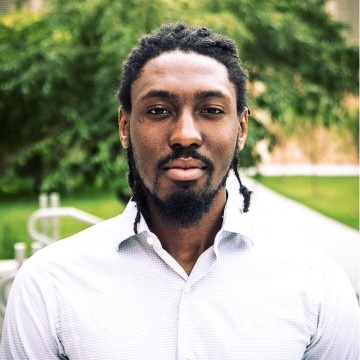Want more insights in your inbox?
Subscribe to our monthly newsletter.
Subscribe to our monthly newsletter.
February is Black History Month – a time dedicated to celebrating, recognizing, and remembering the achievements of the Black community in America. According to the Association for the Study of African American Life and History, this year’s theme, “Black Health and Wellness,” was selected because it “acknowledges the legacy of not only Black scholars and medical practitioners in Western medicine, but also other ways of knowing (e.g., birth workers, doulas, midwives, naturopaths, herbalists, etc.) throughout the African Diaspora.”
This Black History Month is especially significant because it marks the first in which Cadent has the Black Employees Network to lead the way in planning and organizing events to commemorate the heritage of Black Americans. As a part of our celebrations, we spoke with some of our Black colleagues to learn more about who they are, their experiences in and out of the workplace, and what Black History Month means to them.

Shomar Lowe, Linear Sales Planner, has been with Cadent for nearly three years, helping our Planning team develop efficient media plans for their cable and broadcast TV activations. An athlete and avid sports fan, when he’s not at work, you can often find him watching one of his favorite teams.
To learn more about Shomar, check out our Q&A below.
The following interview has been lightly edited and condensed.
Tell us about your role
I’m a Linear Sales Planner based out of the New York office. As a sales planner, I help build media plans to match our client’s requests – whether it’s based on CPM/CPP ratings, impressions goals, or both. I also coordinate with the Inventory team to ensure campaigns are delivering as planned.
What’s your favorite thing to do when you’re not at work?
I like sports, so depending on the time of year, you’ll find me watching the Knicks, Arsenal and Paris Saint-Germain, or the New York Giants. I also enjoy exploring new breweries, collecting vinyl records and sneakers, and checking out new music.
Are there any mentors or experiences that shaped your career?
Two people: one of my good friends from college and an account executive at my previous job. They each helped me learn how to navigate the sales industry, especially as a Black employee. Both taught me skills so that I could be successful in my role today as well as future roles.
What does Black History Month mean to you and how are you planning to celebrate this year?
This month is meant to highlight some of the greatness that Black people have contributed to society – everything from clothes to art, to social awareness. I will look to continue patronizing Black-owned businesses and increase my awareness of contemporary Black artists.
Do you have any favorite movies, books, art, or music made by Black creators?
There are many, but here are just a few:
Books: Steve Biko’s I Write What I Like, Huey P. Newton’s Revolutionary Suicide, and Kobe Bryant’s The Mamba Mentality.
Music: J Dilla’s Donuts, Nas’ Illmatic, Jay-Z’s Reasonable Doubt, Isaac Hayes’s Black Moses, Robert Glasper’s In My Element, and Michael Jackson’s Off the Wall.
Art: Jean-Michel Basquiat’s Untitiled (Boxer), Kehinde Wiley’s Portrait of Barack Obama, and Anthony Akinbola’s Camouflage #005.
Movies: Spike Lee’s Malcolm X and Do the Right Thing, Boots Riley’s Sorry to Bother You, and John Singleton’s Boyz n the Hood.
This year, ASALH’s Black History Month theme is “Black Health and Wellness.” Can you tell us what “Black Health and Wellness” means to you?
Take care of yourself in all aspects – mind, body, and soul. Keeping yourself organized, eating well and exercising, making time for friends and family, and indulging in hobbies or interests are each a part of your wellness.
What do you feel helps to foster a culture of inclusion? How have you seen those behaviors and practices successfully put into action?
It’s important to be open to everyone’s differences and show those differences, from C-level executives to entry-level employees. This is successfully put into action when collaboration is used to celebrate culture – no matter how big or small the group – allowing their voice to be heard and acknowledged in an authentic way, rather than using an idea of what it “should be” to move forward.
If you could have dinner with any important Black figure – a civil rights pioneer, politician, musician, artist, author, activist, etc. – living or dead, who would it be and why?
There are two people that come to mind. The first is Huey P. Newton, as it would be interesting to learn about how he focused on the formation and growth of the Black Panther Party, as well as working on its other programs, such as medical clinics and free food for kids. I would also ask if or how he sees remnants of the Party in any of today’s sociopolitical organizations.
The second would be J Dilla, because it would be interesting to learn about how he was able to bring his ideas to life with – seemingly – such ease, and how he was able to stay motivated and focused, especially during the time of his declining health.
What has been your proudest moment at Cadent?
It has to be when I was recognized for my efforts with a Crushing It at Cadent award last summer!
What advice would you give to a younger colleague or a younger version of yourself?
Get a mentor and learn the ropes, apply yourself 100% to whatever you are doing – no matter how insignificant it may seem, and always have an opinion.
Learn more about life at Cadent and see available roles on our Careers page.
Subscribe to our monthly update to get at all the latest from Cadent.